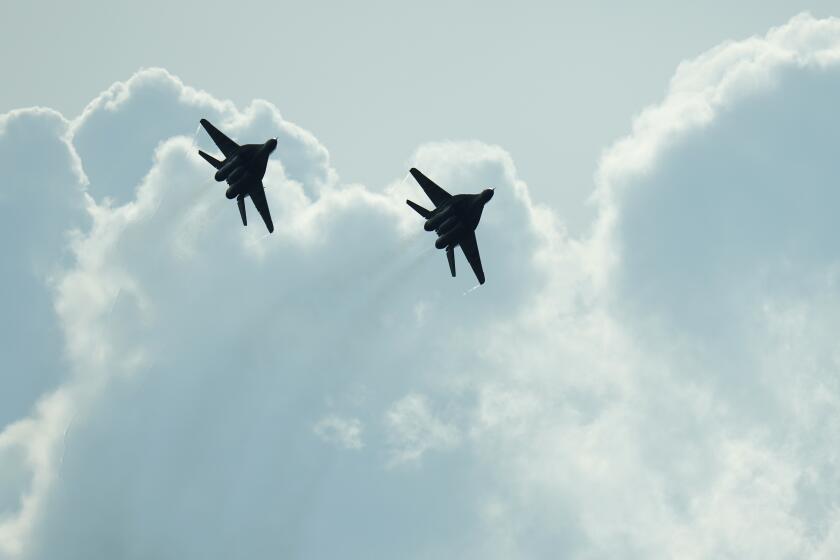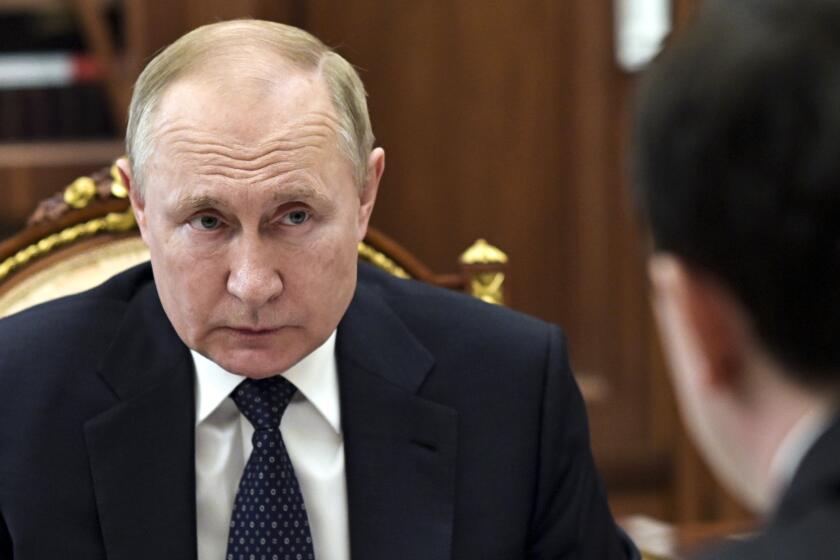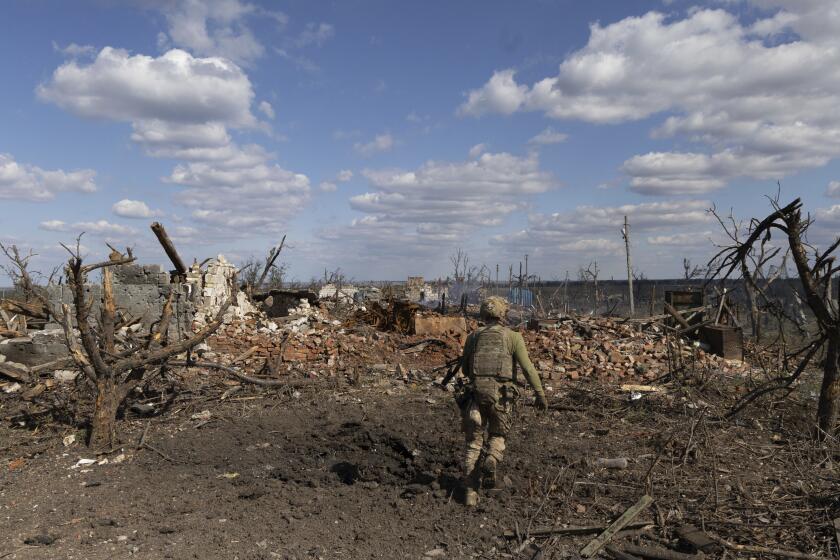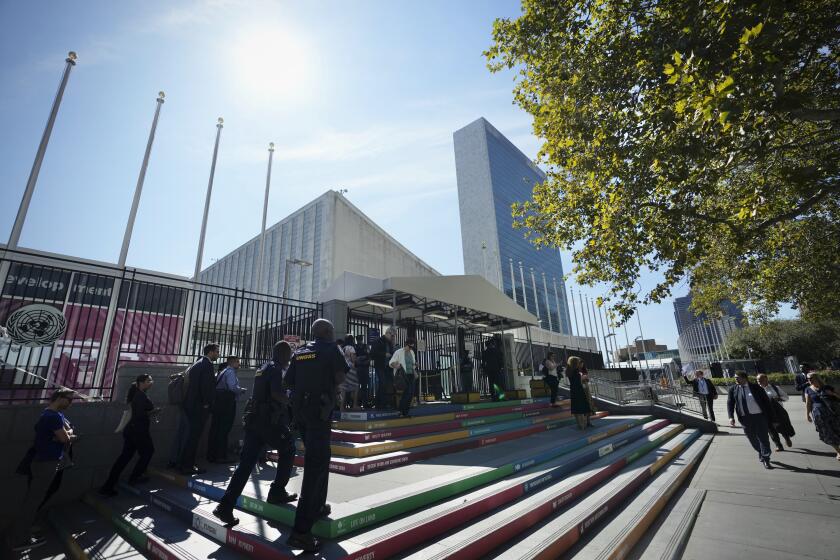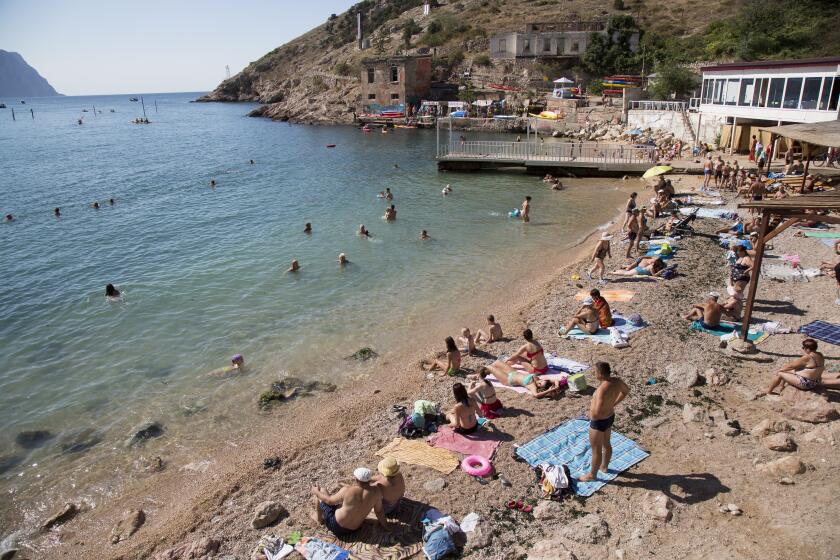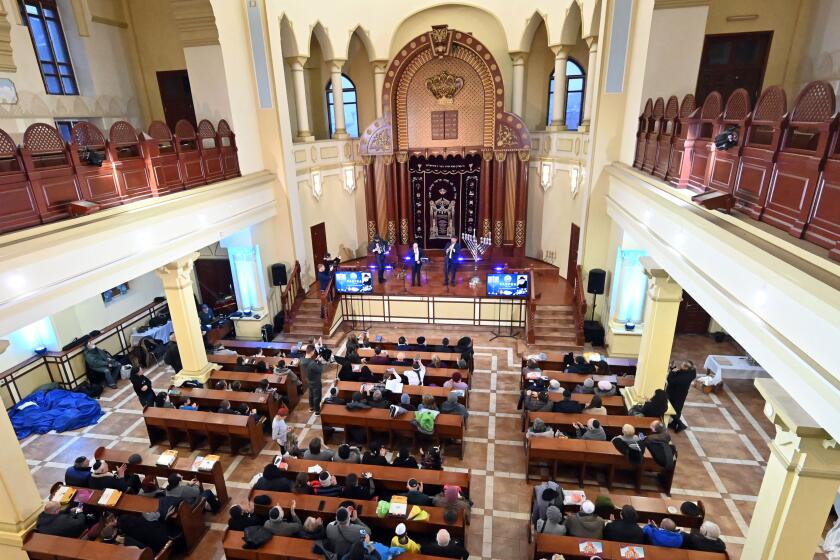In challenge for NATO, election front-runner in Slovakia wants to end aid to Ukraine
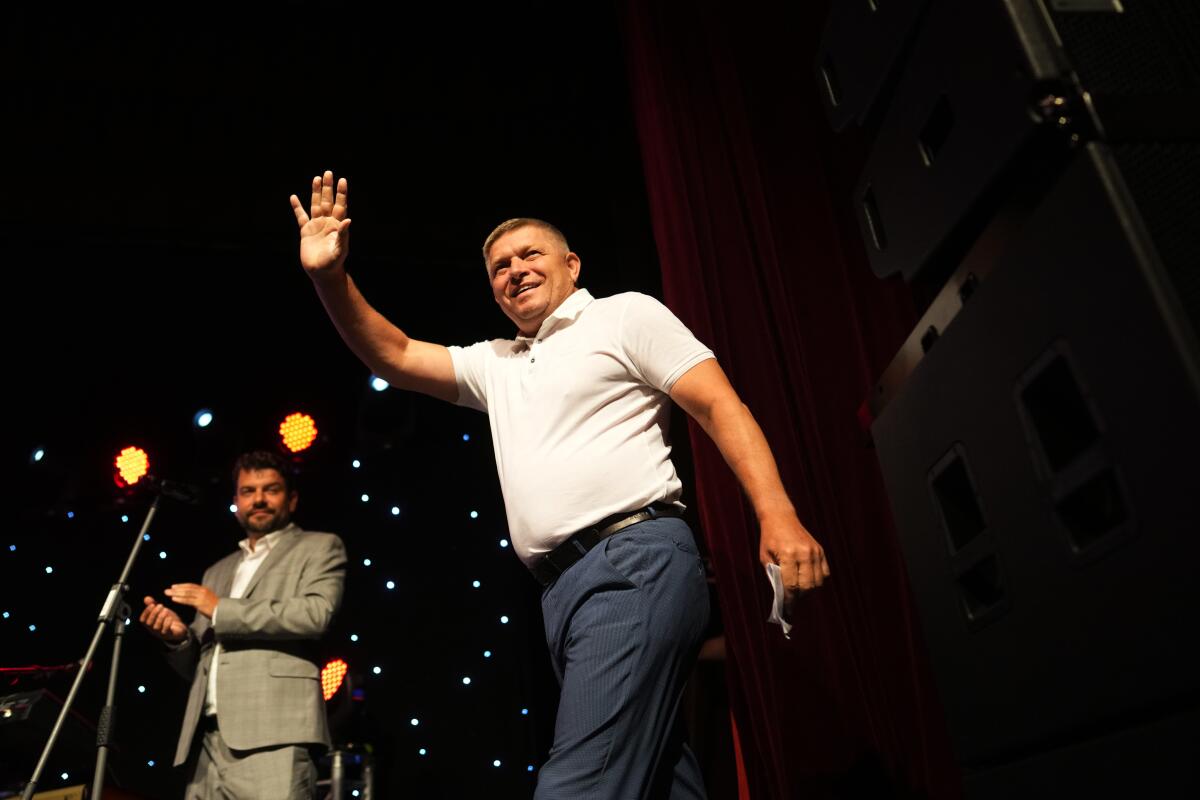
- Share via
MICHALOVCE, Slovakia — A populist former prime minister whose party is favored to win Slovakia’s parliamentary election plans to reverse the country’s military and political support for neighboring Ukraine, in a direct challenge to the European Union and NATO, if he returns to power.
Robert Fico, who led Slovakia from 2006 to 2010 and again from 2012 to 2018, is the front-runner in the Sept. 30 election. He and his left-wing Smer, or Direction, party have campaigned on a clear pro-Russian and anti-American message.
His candidacy is part of a wider trend across Europe. Only Hungary has an openly pro-Russian government, but in Germany, France, Spain and elsewhere, populist parties skeptical of intervention in Ukraine command significant support. Many have national or regional elections coming up that could tip popular opinion away from Kyiv and toward Moscow.
“If Smer is part of the government, we won’t send any arms or ammunition to Ukraine anymore,” Fico, who currently holds a seat in Slovakia’s parliament, said in an interview with the Associated Press before a recent campaign rally.
Fico, 59, also opposes EU sanctions on Russia, questions whether Ukraine can force out the invading Russian troops and wants to block Ukraine from joining NATO. His return to power could lead Slovakia to abandon its democratic course in other ways, following the path of Hungary under Prime Minister Viktor Orban and, to a lesser extent, Poland under the ruling Law and Justice party.
The small Central European nation created in 1993 following the breakup of Czechoslovakia has been a staunch supporter of Ukraine since Russia invaded more than 18 months ago. Slovakia was the second NATO member to give its fleet of Soviet-era MiG-29 fighter jets to Kyiv and also donated an S-300 air-defense system.
Slovakia has delivered the remaining nine of the 13 Soviet-era MiG-29 fighter jets that it promised to Ukraine, which has clamored for warplanes.
But it also has seen public trust in liberal democracy and Western organizations decline to a greater extent than other parts of the region that also shook off decades of Soviet domination.
According to a March survey of eight nations by Slovakia’s Globsec think tank, 51% of Slovak respondents believe the West or Ukraine is responsible for the war. Half saw the United States as posing a security threat to their country, up from 39% in 2022 and the highest proportion of people in the nations surveyed. Bulgaria was a distant second with 33% and Hungary third with 25%.
“We have a big problem,” said Katarina Klingova, a senior research fellow at Globsec’s Center for Democracy and Resilience.
The survey was conducted in Bulgaria, the Czech Republic, Hungary, Latvia, Lithuania, Poland, Romania and Slovakia.
Will inflation and energy woes crack Western unity over Ukraine? Putin likely hopes so.
Only 48% of Slovaks consider liberal democracy good for their country, the second-lowest result after Lithuania (47%).
In February 2022, Slovakia opened its borders to Ukrainian refugees. It also began sending arms to Kyiv. Nonetheless, many Slovaks have a soft spot for their Russian Slavonic brethren and are grateful to the Red Army for liberating their country at the end of World War II.
The Globsec survey reflects frustration following the chaotic tenure of a center-right coalition government that collapsed in December and a pro-Russia disinformation campaign that intensified after the Ukraine invasion, Klingova said.
“A number of local politicians have adopted the narratives and terminology of the Russian propaganda” and amplified its impact, she said. Fico, whose party also campaigns against immigration and LGBTQ+ rights, is among them.
Six Ukrainian deputy defense ministers have been fired following the dismissal two weeks ago of their boss in a procurement corruption scandal.
In the AP interview, Fico insisted that no amount of Western weapons going to Ukraine would change the war’s course. The European Union and the United States should use their influence to force Russia and Ukraine to strike a compromise peace deal, he said.
“It’s naive to think that Russia would leave Crimea,’’ Fico said of the peninsula Russia annexed from Ukraine in 2014. “It’s naive to think that Russia would ever abandon the territory it controls.”
Fico spoke in Michalovce, near Slovakia’s border with Ukraine, where in the spring of 2022, thousands of Ukrainian refugees entered Slovakia, while humanitarian aid — and sometimes foreign fighters — flowed the other way.
More recently, Ukrainian grain shipments have crossed the border, to the unhappiness of local farmers. When an EU deal to keep Ukrainian grain out of local markets lapsed this month, Slovakia said it would extend its own ban on imports until the end of the year.
Start your day right
Sign up for Essential California for the L.A. Times biggest news, features and recommendations in your inbox six days a week.
You may occasionally receive promotional content from the Los Angeles Times.
But even as the war in Ukraine drove down grain prices in Europe, it pushed up energy costs. Until the invasion of Ukraine triggered EU sanctions, Russia supplied most of Slovakia’s oil and gas.
Last year, inflation rose to 12.13% percent, driven by soaring energy prices. In September 2022, thousands joined a protest organized by Fico’s party, at which he blamed Slovakia’s support for Ukraine.
Ukrainian President Volodymyr Zelensky, backed by Western supporters, has ruled out negotiating with Moscow until Russian troops withdraw. He has also pressed for a clear path to NATO membership.
At their summit in July, NATO leaders pledged to keep supplying arms but offered Ukraine no protection under the alliance’s security umbrella. Fico told the AP that he opposes putting Ukraine on a membership path: “That would result in the Third World War.”
Russia’s war on Ukraine and Ukrainian President Zelensky on center stage at United Nations meeting, but climate change, poverty, gender inequality also in focus.
In 2015, after Russia annexed Crimea, Fico was one of the few European leaders to meet with Russian President Vladimir Putin in Moscow, despite EU sanctions.
However, he also took care to cultivate ties with the United States. In 2018, he began negotiations on a defense treaty with Washington. The agreement was ratified last year, but not before Fico told a protest that it was “treason” and that it would compromise Slovakia’s sovereignty and provoke Russia — claims rejected by the Slovak and U.S. governments.
Now, Fico repeats Putin’s unsupported claim that the Ukrainian government runs a Nazi state from which ethnic Russians in the country’s east needed protection.
“The war in Ukraine didn’t start yesterday or last year. It began in 2014, when the Ukrainian Nazis and fascists started to murder the Russian citizens in Donbas,” Fico told cheering supporters last month.
With bombs and drones, Ukraine aims to dislodge Russia’s hold on the Crimean peninsula and bring it back under Kyiv’s authority, despite Putin’s claims.
Fico used to be more pragmatic. During his first term as prime minister, Slovakia was accepted into the EU’s visa-free Schengen Area in 2007 and adopted the euro as its currency in 2009. Following the fall of the government that replaced his, Fico returned to office in 2012.
He unsuccessfully ran for president in 2014 and reclaimed the premiership in 2016, but was forced to resign two years later after the slaying of investigative journalist Jan Kuciak and his fiancée.
Before his death, Kuciak had written about alleged ties between the Italian mafia and people close to Fico and corruption linked to Fico’s party. The killings prompted street protests and led to the collapse of Fico’s coalition government.
Fico’s scandal-tainted Smer party, campaigning on an anti-migrant ticket, lost the 2020 election. The four-party coalition government that took over made fighting corruption a key focus.
In a Ukrainian city devastated by bombing, the seasons of Jewish life find expression. Amid the sorrow of war, Rosh Hashana brings hope, even joy.
Dozens of senior officials, police officers, judges, prosecutors, politicians and business people linked to Smer have been convicted of corruption and other crimes.
Fico himself faced criminal charges last year of creating a criminal group and misuse of power, but Slovakia’s pro-Russia prosecutor general threw out the indictment.
Almost all polls predict a first-place result for Smer in the parliamentary election, with about 20% of the vote. Fico would then need other parties’ support to form a government.
“His strong motivation is to avoid criminal investigation,” said Grigorij Meseznikov, president of the Institute for Public Affairs, a pro-democracy nongovernmental organization. “His return to power will be a problem for Slovakia in every aspect.”
More to Read
Sign up for Essential California
The most important California stories and recommendations in your inbox every morning.
You may occasionally receive promotional content from the Los Angeles Times.
